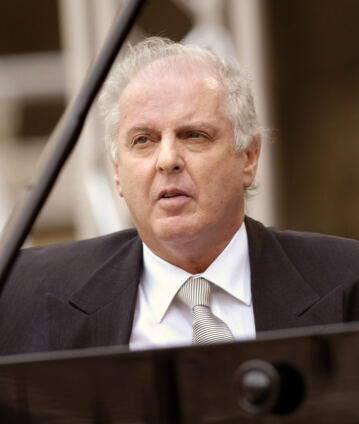A “St Petersburg Night” with Daniel Barenboim and Zubin Mehta at the Waldbühne

This concert sees the meeting of two musicians who have enjoyed an unusually long friendship with each other and with the orchestra: Daniel Barenboim and Zubin Mehta. In glorious weather and against an atmospheric backdrop at the Waldbühne, they presented an evening of Russian music ranging from Glinka to Rimsky-Korsakov with the theme of a “Saint Petersburg Night”. Barenboim, a pianist rarely seen in the Russian repertoire, shone in Tchaikovsky’s famous First Piano Concerto.
In his autobiography, Zubin Mehta calls his friendship with Daniel Barenboim “a stroke of good fortune for me”. It began in 1956, when Mehta was 20, and Barenboim was 12 years old. Although their meteoric careers soon took the musicians to distant parts of the globe, they played together again and again, and Barenboim has performed as a pianist more often with Mehta than with almost any other conductor. This partnership has resulted in performances and recordings of piano concertos by Mozart, Beethoven, Liszt and Brahms. For years, they have performed at each other’s important birthdays, whether with Barenboim’s Staatskapelle in Berlin or at the Maggio Musicale Festival in Florence, where Mehta was music director from 1985 to 2018. And at a special encounter in 1969, when Barenboim at the piano performed Schubert’s Trout Quintet with Itzhak Perlman, Pinchas Zukerman and Jacqueline du Pré, Mehta unceremoniously took on the double bass part.
What both musicians also have in common is that since the 1960s they have been among the Berliner Philharmoniker’s most significant and loyal artistic partners and now belong to the orchestra’s exclusive circle of honorary members. Barenboim’s second performance with the Philharmoniker saw their first collaboration with the orchestra: under the direction of Mehta, he played Wilhelm Furtwängler’s Symphonic Concerto for Piano and Orchestra. They also later recorded another rarity together: Richard Strauss’s Burleske.
Another highlight was dedicated to Russian music: the 1997 Waldbühne concert, where Barenboim – whose forefathers emigrated from Tsarist Russia to Argentina – was the soloist in Tchaikovsky’s First Piano Concerto, a work in which two virtuoso outer movements frame a beguilingly elegiac Andante semplice. Together with the other works of the programme, a panorama emerged of 19th century Russian music: it ranged from the Ruslan and Ludmilla overture by Mikhail Glinka, who was considered the founding father of the musical nation, to Tchaikovsky, to pieces by Modest Mussorgsky and Nikolai Rimsky-Korsakov. The performances in the concert combined electrifying rhythms with detailed precision: “Under Zubin Mehta the short pieces collected under the theme of a ‘Saint Petersburg Night’showed themselves to be not only crowd pleasers, but also pieces of music full of fine features. Mehta replaced garish sound with distinctive characteristics and almost big-band-like precise rhythms” (Berliner Zeitung).
© 1997 VIDEAL / brilliant media, EuroArts Berlin, SFB, NHK Tokyo
Category
Artists
Our recommendations
- Simon Rattle conducts film scores at the Waldbühne
- Gustavo Dudamel conducts Wagner and Schumann at the Waldbühne
- Simon Rattle and Magdalena Kožená at the Waldbühne
- James Levine conducts Wagner and Strauss at the Waldbühne
- A “Latin American Night” at the Waldbühne with Daniel Barenboim
- Mariss Jansons conducts music from the Austro-Hungarian Empire at the Waldbühne